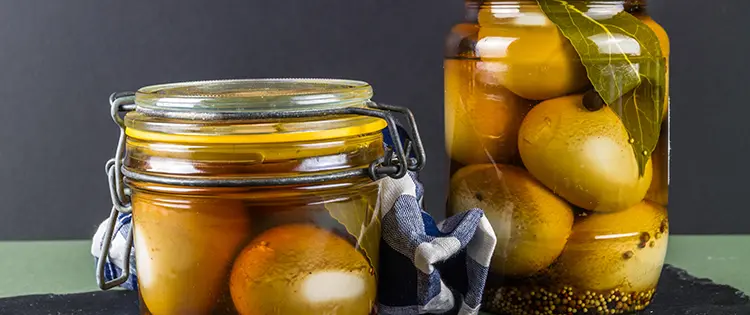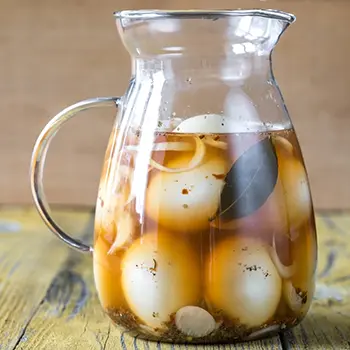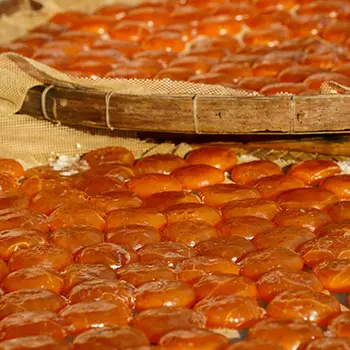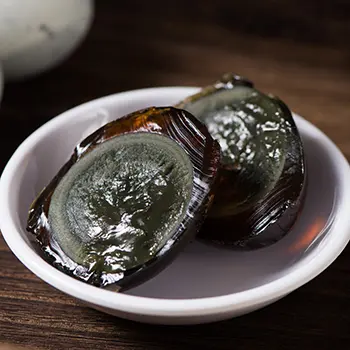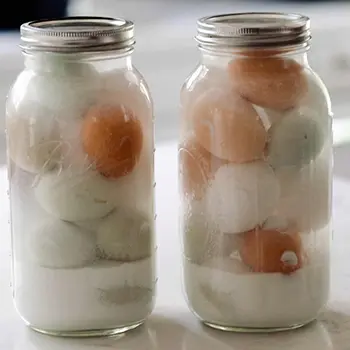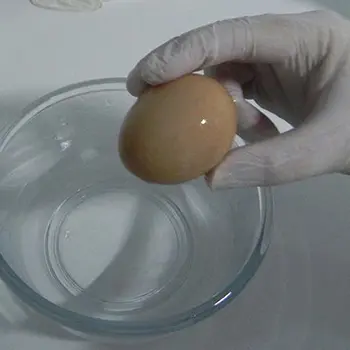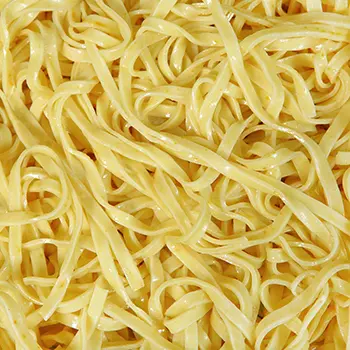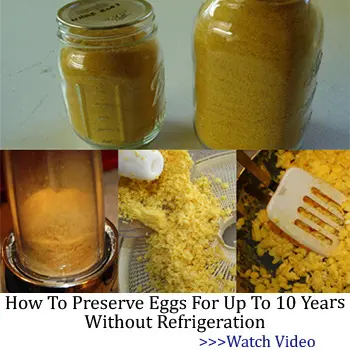Eggs are a relatively cheap and highly nutritious meal. They are also fresh foods that may be difficult to acquire in a crisis unless you happen to own a chicken.
While eggs are usually not what we think of when discussing stockpiles, there are various ways to preserve them and make them last longer than they usually would.
Don’t Wash Eggs
Unwashed eggs have a protective coating called bloom. They can be safely stored on the counter for three weeks. If stored in the refrigerator, they are good for up to three months.
Unwashed or not, once refrigerated, eggs should not be left on the counter for more than two hours.
Freeze Eggs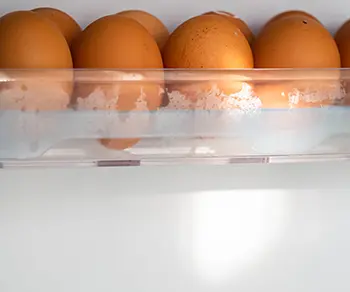
Did you know you can freeze eggs, whether they are raw or cooked?
If you lightly scramble an egg and pour the mixture into an ice cube tray, eggs can last up to a year. This storage method is an option if you hope to have access to raw, uncooked eggs at any time, just defrost while cooking.
Alternatively, you can freeze eggs that have been cooked. If you have seen the breakfast sandwiches they sell at convenience stores, this is how they are made.
When I make eggs to freeze, I usually scramble them using water rather than milk. I will cook up one large bath before separating it into portions to freeze in an airtight container.
You can also create small egg patties if you cook them in a muffin tin and then freeze them. I do this often and add other things like ham or peppers. These little egg bites are a favorite for kids.
Pickle Eggs
Pickling is not just for grandma anymore; this popular pastime is so easy that anyone can do it.
Pickling eggs is a great way to extend their shelf life and switch things up.
Here is a step-by-step guide on how to pickle eggs.
Pickled eggs have a shelf life of 6 months.
Cure Eggs
Cured egg yolks are all the rage right now and are so tasty. Curing is a popular form of preservation and is used on various foods.
You can cure eggs by coating them with salt. Add sugar to create sweet and salty eggs, or use flavors like rosemary.
To cure eggs, you must cover the unbroken egg yolk in salt, along with any other flavors you want to try. Ensure you are using enough salt to fully shield the egg entirely. Once covered, place the tray with the eggs and salt in a cool, dry place for a few weeks.
As the yolks harden, they absorb the flavors, leaving you with a solid mass that tastes amazing and can be rehydrated to use in other ways.
Dehydrate Eggs
Mix the yolks and whites of the eggs and spread them on a lined baking sheet.
Dry the eggs in a low-temperature oven or use a dehydrator.
Dehydrating eggs can get a bit complicated, but we will try to keep it simple.
Remember that eggs should always be fully cooked before drying to prevent the risk of food poisoning.
To dehydrate eggs, scramble a half-dozen in a bowl. Cook entirely in a non-stick pan. Arrange the cooked eggs on the dehydrator pan – you want to ensure there are no large chunks. Dehydrate at 150 degrees for approximately 4 hours.
While you can dehydrate eggs in an oven, it will take significantly longer – like 10 hours at 165 degrees. Therefore this method is excellent if you own a dehydrator, but it takes a long time if you do not.
Powder eggs
Powdered eggs are a popular option for storage, but they can be pricey. Make egg powder at home, dehydrate eggs using the previous instructions, and grind them into a fine powder.
Store egg powder in an airtight container.
Honey And Salt
You can preserve eggs by coating them with honey and salt and storing them in a cool, dry place. Ensure the eggs are thoroughly covered in honey and salt and there are no bare spots to be seen.
I could not find a source for this storage method, but it is an approach my grandma said her mother used. Take it with a grain of salt.
Use Sugar To Preserve Eggs
Create a natural preservative by mixing equal parts egg whites and sugar, and coat the eggs before storing them. This process works with the natural coating of the egg to extend its shelf life.
Make Century Eggs
Creating century eggs was a long process typical in kitchens back in the 1800s. I found many recipes for this process, some for raw eggs and others for boiled.
The traditional method involves coating the eggs in a mixture of clay, ash, and water to create a protective layer.
Here is a step-by-step guide on how to make century eggs.
Make Egg Jerky
Mix eggs with your choice of seasonings, and a sweetener (sugar or honey), then spread the mixture thinly on a lined baking sheet.
Dry at a low temperature in the oven (e.g., 165-175 degrees) for several hours, and you can create what can be called egg jerky.
Sundried Eggs
An interesting idea I encountered involved drying eggs in the sun by placing them on a tray or rack in a sunny location and allowing them to dry out completely. I question the safety of this process, but it appears to be popular.
Store Eggs In Lime And Water
Another historical preservation of eggs is storing them using lime and water.
This preservation method is also known as water glassing.
Keeping your eggs in a mixture of lime and water will help to preserve them and prevent the growth of bacteria.
Add an equal ratio of water and lime to your bucket. Mix until dissolved. Gently place eggs into the container.
Secure the lid to prevent evaporation. Store in a cool, dark, and dry location. Pull eggs as needed, and wash before use.
Preserve Eggs In Salt
Salt has long been used to preserve eggs. However, preserving the entire egg is a bit different.
Try this by boiling a mixture of 1c salt and 4c water and allowing it to cool. Place eggs in a large glass jar or other container and pour the mixture over the top, ensuring all the eggs are covered. Store them in a cool, dark, dry place for 3-4 weeks.
Curing will depend on how salty you want your eggs to be. Test if the eggs are done by removing and boiling and tasting one egg. If it is good enough, remove the rest. If not, let them sit longer.
Salted eggs can be stored in the fridge for a month or boiled and frozen for much longer.
Preserve Eggs In Oil
Coating eggs in mineral oil and putting them back in the carton with the pointy side down will make your eggs last much longer. Rotating them monthly is strongly recommended.
If you keep them in a cool, dark, and dry place, they should stay good for up to nine months.
Wax Eggs
Use wax to coat eggs and create a protective barrier that will help preserve them. I stumbled across an article about coating eggs in Vaseline to extend their shelf life, and I was initially hesitant. However, it seems many people use this method, and some say it makes their eggs last for months.
Besides Vaseline, food-grade mineral oil can be used to coat eggs, or any oil that does not spoil, such as coconut oil. Just remember to store them with the fat end up to avoid issues related to the air bubble that naturally lives within an egg.
I’m pretty sure this approach works because it locks in the natural coating on freshly laid eggs, keeping them fresh.
It is important to note that this method would not work on grocery store eggs as they have already been sitting for some time.
Egg Noodles
Create egg noodles by mixing eggs, flour, and salt and then drying the noodles in a low-temperature oven. Once dried, store in an airtight container.
Making egg noodles is another way to use up and preserve eggs all at the same time. Plus, egg noodles are super easy to make and delicious.
Create Egg Glue
You can create an egg-based glue by mixing egg whites and flour and then boiling it until it thickens. This ‘glue’ can be used on almost anything.
Preserve Eggs In Alcohol
Eggs just became a lot less boring in my mind. If you soak eggs in a mixture of alcohol and water for several weeks, you can store them for an extended period.
Make Egg Tofu
To make egg tofu, mix eggs and a coagulant, such as vinegar or lemon juice, and cook until it forms a solid mass.
Egg tofu is surprisingly easy to make, provided you have a steamer. You will need the following: 6 eggs, 1/8 tsp salt, and 300 ml of soy milk.
Beat the eggs in a bowl, slowly adding the soy milk while mixing, followed by the salt. Strain into a new bowl to remove any clumps.
Pour into a steamer-safe container and slowly steam for 25-30 minutes. Cut and enjoy or store/freeze in an airtight container
Make Egg Drop Soup
Egg drop soup is a good option for using up eggs and storing them safely. My favorite uses cornstarch and chicken stock as the base, with soy sauce, ginger, onion, celery, and peppers for added flavor and texture.
Once you make this base by mixing all these ingredients, add eggs that have been beaten and gently stir.
Storing eggs long-term is a bit more complicated than storing other foods, but as this list shows, it can be done. With patience, creativity, and knowledge, you can have eggs any time, even in an emergency.
Do you have any tips for storing eggs long-term?
This article first appeared on Ask A Prepper.
How to Keep Eggs Fresh for Months with Mineral Oil
An Insanely Effective Way to Build a 5 Year Food Stockpile (Video)

